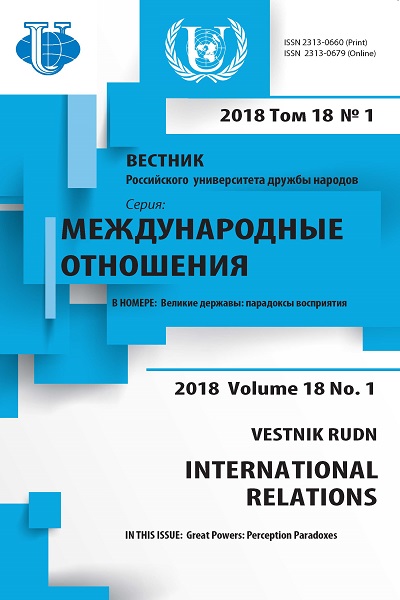Perception psychology on social distance to different countries: Russian view
- Authors: Pochebut L.G.1, Beznosov D.S.2
-
Affiliations:
- Saint Petersburg State University
- Saint Petersburg State Institute of Psychology and Social Work
- Issue: Vol 18, No 1 (2018): Great Powers: Perception Paradoxes
- Pages: 66-84
- Section: THEMATIC DOSSIER
- URL: https://journals.rudn.ru/international-relations/article/view/18377
- DOI: https://doi.org/10.22363/2313-0660-2018-18-1-66-84
Cite item
Full Text
Abstract
Intercultural communication in the modern world is becoming more intense, expanding psychological perception that people have about other peoples and their cultures. This article discusses the psychological characteristics of perception of the students of St. Petersburg social distance to different peoples of the world. The article emphasizes the difficulties of perception and inter-cultural interaction depending on the stereotypes of perception and causal attribution errors and discrimination. Authors state that assertiveness as the ability to protect their rights and interests is evident in the increasing social distance and is a constructive way of protection. The goal of the present empirical research is to study the amount of social distance students of Russian nationality in relation to the representatives of the different ethnic groups of the world. Objectives of the study were to assess the magnitude of social distance in relation to populations that are not part of the Russian Federation; and in determining the dynamics of social distance, depending on political and economic world trends. Method of research is the social distance scale of E. Bogardus. Based on the results of empirical research, the following conclusions were made. The value of social distance students of Russian nationality shows their normal ethnic identity and positive attitude to the different people of the world. Interviewed students realize themselves as a separate ethnic group, have the desire and willingness to cooperate with other peoples. Social distance in relation to European populations is in general closer than to Asian and African ethnicities. Social distance of the students towards the brotherly Slavic peoples (Ukrainians and Belarusians) is closer than to the representatives of other nations, but students are ready to build friendships and business relationships with the Belarusians, as for the citizens of Ukraine and the residents of Donbass they have shown interest in recent years only in business relations. This represents a slight increase in the length of social distance in relation to Ukrainians. People push social distance towards the residents of the country, where a civil war is, psychologically protect, try to be emotionally away from military conflict. Authors conclude that this is a normal psychological reaction. In a situation of a terrorist act, the value of social distance toward terrorists and their victims also sharply increases.
About the authors
Ludmila Georgievna Pochebut
Saint Petersburg State University
Author for correspondence.
Email: ludmila.pochebut@gmail.com
Doctor of Psychology, Professor of the Department of Social Psychology of Saint Petersburg State University
Dmitri Sergeevich Beznosov
Saint Petersburg State Institute of Psychology and Social Work
Email: don_bizon@inbox.ru
PhD in Psychology, the Senior Lecturer of the Faculty of General Psychology of Saint Petersburg State Institute of Psychology and Social Work
References
- Alberti, R.E. & Emmons, M.L. (1995). Your perfect right: A guide to assertive living. San Luis Obispo, CA: Impact.
- Berry, J.W., Poortinga, Y.H., Segall, M.H. & Dasen, P.R. (2002). Cross-Cultural Psychology. Research and Applications. 2nd ed. New York, NY, US: Cambridge University Press.
- Beznosov, D.S. & Pochebut, L.G. (2007). Psychology of the crowd and terrorism. Moscow: TsOKR MVD Rossii. (In Russ.).
- Bogardus, E.S. (1924). Fundamentals of Social Psychology. New York: Century.
- Bogardus, E.S. (1933). Social Distance Scale. Sociology and social research, 17, 265—271.
- Klineberg, O. (1954). Social psychology. New York: Henry Holt & Company.
- Kluckhohn, C. (1949). Mirror for man: The Relation of Anthropology to Modern Life. New York; Toronto: McGraw-Hill Inc.
- Lippmann, W. (1922). Public opinion. New York: Harcourt Brace.
- Berri, D.V. (2005). How will we live together? Alternative vision of intercultural relations. In: Cross-cultural psychology. Actual problems. Ed. by L.G. Pochebut, I.A. Shmelevoi. Saint Petersburg: SPbGU, p. 6—26. (In Russ.).
- Lebedeva, N.M. (1997). The new Russian diaspora. Moscow: Institut etnologii i antropologii. (In Russ.).
- Nel’son, T. (2003). Psychology of prejudice. Saint Petersburg: Praim-EVROZNAK. (In Russ.).
- Pochebut, L.G. (2007). Mutual understanding of cultures. Methodology and methods of ethnic and cross-cultural psychology. Psychology of interethnic tolerance. Saint Petersburg: SPbGU. (In Russ.).
- Pochebut, L.G. (2012). Cross-cultural and ethnic psychology. Saint Petersburg: Piter. (In Russ.).
- Pochebut, L.G. (2005). Psychology of social communities. Saint Petersburg: SPbGU. (In Russ.).
- Pochebut, L.G. (2017). Social Psychology. Saint Petersburg: Piter. (In Russ.).
- Pochebut, L.G. & Meizhis, I.A. (2010). Social Psychology. Saint Petersburg: Piter. (In Russ.).
- Stefanenko, T.G. (2003). Ethnopsychology. Moscow: Aspekt Press. (In Russ.).
- Verderber, R., Verderber, K. (2003). Communication. Saint Petersburg: Praim-EVROZNAK. (In Russ.).











